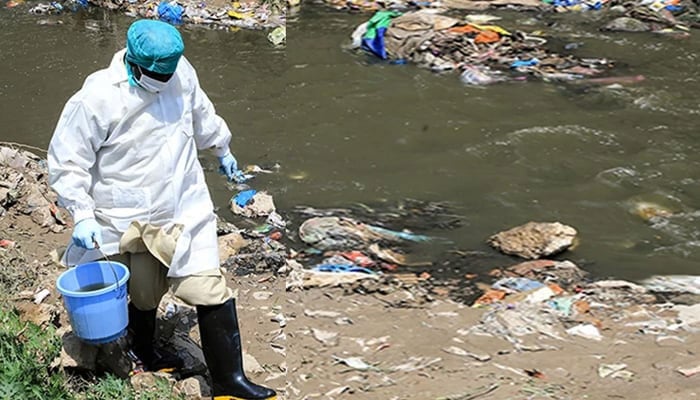Poliovirus in sewage of 8 districts indicates continued transmission
Affected districts include Charsadda, DI Khan, Rawalpindi, Kambar, Jamshoro, Killa Saifullah, and Mastung
ISLAMABAD: Wild poliovirus type 1 (WPV1) has been detected in environmental samples collected from eight districts across Pakistan, raising concerns about the continued transmission of the virus and its threat to children.
The Regional Reference Laboratory for Polio Eradication at the National Institute of Health confirmed the findings based on samples collected between November 5 and 20, 2024.
The affected districts include Charsadda, DI Khan, Rawalpindi, Kambar, Jamshoro, Killa Saifullah, Barkhan, and Mastung.
Notably, this marks the first positive detection from Charsadda this year, which borders Peshawar — a district that has seen persistent WPV1 in its sewage for several months.
The other seven districts have previously reported virus presence, highlighting the challenges of containing the disease in endemic areas.
So far, 63 polio cases have been reported across Pakistan this year, indicating a resurgence of the virus.
The alarming detection of WPV1 in multiple districts underscores the urgent need to protect children from a disease that causes irreversible paralysis but is entirely preventable through vaccination.
The National Polio Programme is launching a nationwide vaccination drive from December 16 to 22, targeting over 44 million children under five years of age in 143 districts. The oral polio vaccine (OPV) will be administered door-to-door by vaccinators to ensure maximum coverage. “Polio is incurable, but it is entirely preventable through the timely administration of multiple doses of OPV,” said a spokesperson for the Polio Programme.
In addition to the OPV campaigns, routine immunization against 12 preventable childhood diseases, offered free through the Expanded Programme on Immunization (EPI), provides an essential immunity boost.
Health authorities have urged parents to ensure their children receive two drops of OPV whenever vaccinators visit their homes. “Parents and caregivers must cooperate with vaccination teams to protect children from this devastating disease,” the spokesperson added.
Polio resurgence remains a pressing public health concern in Pakistan, one of only two countries in the world still battling wild poliovirus. Authorities are calling for collective efforts to bridge immunization gaps and eliminate the virus from the country for good.
-
 Why Nicole Kidman 'not Rushing' Into Love After Split From Keith Urban?
Why Nicole Kidman 'not Rushing' Into Love After Split From Keith Urban? -
 Benny Blanco's Dirty Feet In Debut Podcast Divide The Internet
Benny Blanco's Dirty Feet In Debut Podcast Divide The Internet -
 Jeffrey Epstein Blamed King Charles As Andrew Left Trade Enjoy Job
Jeffrey Epstein Blamed King Charles As Andrew Left Trade Enjoy Job -
 King Charles Asked To Lean On Princess Anne To Avoid ‘media Circus’
King Charles Asked To Lean On Princess Anne To Avoid ‘media Circus’ -
 Passenger Wins £10,000 Payout From Heathrow Airport After 100 Ml Liquids Dispute
Passenger Wins £10,000 Payout From Heathrow Airport After 100 Ml Liquids Dispute -
 Eric Dane's Costar Under Fire For Hurling Accusations At Him After His Death
Eric Dane's Costar Under Fire For Hurling Accusations At Him After His Death -
 Queen Camilla Greets The Paddington Bear At BBC’s 500 Words Grand Final
Queen Camilla Greets The Paddington Bear At BBC’s 500 Words Grand Final -
 Chinese Astronauts Finally Reveal Why Spacecraft Left Them ‘stranded’ For 437 Days In Space
Chinese Astronauts Finally Reveal Why Spacecraft Left Them ‘stranded’ For 437 Days In Space -
 Sinitta Makes Shock Admission About Marriage To Andy Willner Post Simon Cowell Heartbreak
Sinitta Makes Shock Admission About Marriage To Andy Willner Post Simon Cowell Heartbreak -
 Bill Gates Calls Ties To Jeffrey Epstein 'huge Mistake,' Reveals Past 'affairs'
Bill Gates Calls Ties To Jeffrey Epstein 'huge Mistake,' Reveals Past 'affairs' -
 Switzerland Announces One-time Compensation For Swiss Bar Fire Victims
Switzerland Announces One-time Compensation For Swiss Bar Fire Victims -
 Ryan Coogler Shares Thoughts About Building Community Of Actors Amid 'Sinners' Success
Ryan Coogler Shares Thoughts About Building Community Of Actors Amid 'Sinners' Success -
 Heidi Klum Gushes Over Diplo Collab 'Red Eye' Despite DJ Falling Asleep During Video
Heidi Klum Gushes Over Diplo Collab 'Red Eye' Despite DJ Falling Asleep During Video -
 Israel Behind Majority Of Journalist Deaths Worldwide, Watchdog Claims
Israel Behind Majority Of Journalist Deaths Worldwide, Watchdog Claims -
 'It Would Become A Circus' : Inside Jane's Turmoil For 'little Sister' Fergie Whose Hidden From The World
'It Would Become A Circus' : Inside Jane's Turmoil For 'little Sister' Fergie Whose Hidden From The World -
 Inside Cardi B's Real Feelings Related To Stefon Diggs Split Post One Year Of Romance
Inside Cardi B's Real Feelings Related To Stefon Diggs Split Post One Year Of Romance




